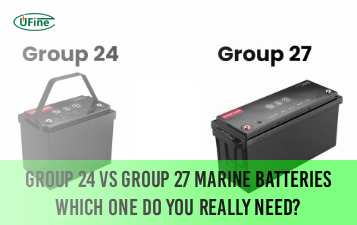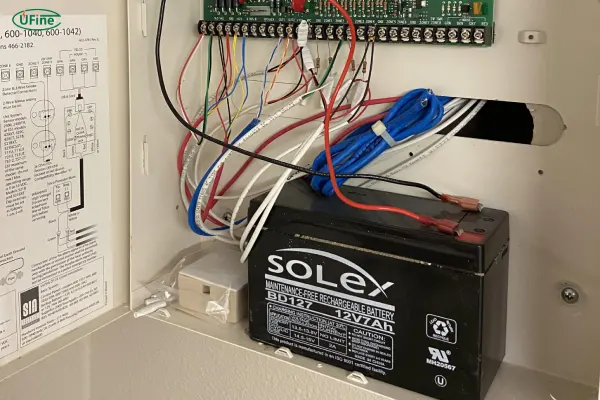
- Part 1. What is a security system battery (or alarm battery)?
- Part 2. How does a security system backup battery work?
- Part 3. What are the main types of security system batteries?
- Part 4. How long does a security system battery last?
- Part 5. What are the signs your security system battery needs replacing?
- Part 6. How do you choose the right backup battery for a home security system?
- Part 7. How do you replace or install a security system battery?
- Part 8. What are the best backup batteries for security systems?
- Part 9. How should you maintain an alarm system battery?
- Part 10. How do you extend security system battery life?
- Part 11. What happens if your security system battery dies?
Part 1. What is a security system battery (or alarm battery)?
A security system battery, also called an alarm battery or backup alarm battery, is a specialized power source designed to keep your security devices operational when the main power supply fails. Unlike standard household batteries, these batteries are engineered to provide reliable, long-lasting energy under continuous load conditions.
Key characteristics of security system batteries include:
- Stable voltage output: Critical for sensitive electronics.
- Rechargeable capability: Many batteries are designed to recharge automatically via the security panel.
- Durability: Resistant to temperature fluctuations and occasional overcharging.
Some systems use sealed lead-acid (SLA) batteries, while newer models may employ lithium-ion or nickel-metal hydride (NiMH) chemistries for extended life and lighter weight.
AGM VS Lithium VS Lead-Acid Battery: Comprehensive Comparison
Part 2. How does a security system backup battery work?
A backup battery for a security system functions as an emergency power source. When the main AC power goes out, the battery automatically supplies energy to the system. This seamless transition ensures that alarms, sirens, monitoring panels, and wireless sensors continue to operate without interruption.
Most systems monitor battery status and send notifications if the charge drops below a certain threshold. Wireless alarms often rely entirely on battery power, meaning the alarm battery is not just a backup but the primary power source. Proper selection and maintenance are therefore crucial for maintaining system reliability.
Part 3. What are the main types of security system batteries?
1. Sealed Lead-Acid (SLA) Batteries
- Widely used in both wired and hybrid systems.
- Spill-proof and maintenance-free in most cases.
- Reliable and cost-effective, though heavier than lithium batteries.
2. Lithium-Ion Batteries
- Lightweight and long-lasting, often up to 5–7 years.
- Low self-discharge, meaning they retain charge over long periods.
- Ideal for high-end security systems requiring minimal maintenance.
3. Nickel-Metal Hydride (NiMH) Batteries
- Rechargeable and environmentally friendly.
- Moderate energy density; less common in modern security systems.
4. Alkaline Batteries
- Usually used for small wireless sensors or remote devices.
- Disposable, requiring frequent replacement.
By understanding the characteristics of each type, homeowners and businesses can make informed decisions when purchasing a backup alarm battery.
Part 4. How long does a security system battery last?
The lifespan of a security system battery varies by type and usage:
- Sealed lead-acid (SLA): 3–5 years with proper maintenance.
- Lithium-ion: 5–7 years, with very low self-discharge.
- NiMH: 2–4 years, depending on cycling and temperature.
- Alkaline (for sensors): 6–12 months.
Factors affecting battery life include:
- Frequency of power outages or system use.
- Temperature extremes; high heat can accelerate degradation.
- Regular maintenance and testing.
- The age of the battery at installation.
Understanding how long a security system battery lasts helps prevent unexpected failures and ensures continuous protection.
Part 5. What are the signs your security system battery needs replacing?
Recognizing warning signs of a failing alarm battery can prevent system downtime:
- Low-battery warnings: Audible beeps or notifications on your panel.
- Reduced backup time: The battery no longer sustains the system for its rated duration.
- Physical changes: Swelling, leakage, or corrosion at terminals.
- Intermittent alarm activation: Sensors may fail to communicate reliably.
Replacing a battery promptly maintains system reliability and safety. Most users benefit from checking battery status at least twice per year.
Part 6. How do you choose the right backup battery for a home security system?
Selecting the correct backup battery for a home security system involves several steps:
- Match specifications: Ensure the voltage and amp-hour (Ah) rating align with the system manufacturer’s recommendations.
- Consider system demands: Larger systems with multiple zones and accessories require higher-capacity batteries.
- Budget vs. performance: While lithium-ion may have a higher upfront cost, the long-term reliability and lifespan often justify the investment.
- Check compatibility: Verify that the battery fits the physical compartment in the control panel.
The goal is to balance cost, performance, and longevity while maintaining uninterrupted protection.
Part 7. How do you replace or install a security system battery?
Replacing a security system battery is generally straightforward, though safety is crucial:
- Power down the system: Disconnect from the AC mains if possible.
- Remove the old battery: Carefully detach terminals and note polarity.
- Install the new battery: Connect positive and negative terminals correctly.
- Test the system: Verify that the control panel recognizes the battery and check backup operation.
For users uncomfortable with electrical components, professional installation ensures safe handling, especially for sealed lead-acid and lithium-ion types.
Part 8. What are the best backup batteries for security systems?
Popular and reliable options include:
- Yuasa SLA Batteries: Durable, widely recommended for wired and hybrid systems.
- Panasonic Lithium-ion Backup Batteries: Lightweight and long-lasting, ideal for modern wireless systems.
- VARTA and Exide: Offer high-capacity SLA options with excellent cycle life.
- Generic brands: Usually less expensive, but often have shorter lifespans and inconsistent performance.
Searching for best backup battery for home security system often highlights these brands, indicating strong user trust and high search interest.
Part 9. How should you maintain an alarm system battery?
Proper maintenance is key to maximizing battery life:
- Test regularly: Use a multimeter or rely on system self-tests.
- Keep terminals clean: Prevent corrosion by wiping contacts and applying protective grease if recommended.
- Recharge as needed: Use compatible smart chargers for rechargeable batteries.
- Store spares properly: Keep extra batteries in a cool, dry place.
Following these maintenance tips for alarm battery ensures longevity and minimizes the risk of system failure.
Part 10. How do you extend security system battery life?
In addition to routine maintenance, several practices help extend battery performance:
- Avoid deep discharges; let the battery recharge fully after outages.
- Monitor room temperature; extreme heat accelerates degradation.
- Use smart chargers to prevent overcharging, especially for lithium-ion models.
- Replace batteries before the end of expected lifespan to prevent sudden failure.
With these measures, homeowners can often extend a battery’s service life by 20–30%, ensuring uninterrupted protection.
Part 11. What happens if your security system battery dies?
A dead battery compromises your entire security setup:
- Alarms may fail to sound during intrusions.
- Sensors could stop transmitting data to the control panel.
- Wireless systems may become completely inoperative.
Planning for replacement and regularly monitoring battery health mitigates these risks, ensuring the system remains effective even during outages.
Related Tags:
More Articles

Group 24 vs Group 27 Marine Batteries: Which One Do You Really Need?
What’s the difference between Group 24 and Group 27 marine batteries? Learn size, capacity, and best uses to choose the right one for your boat.
What Is the Energy Density of a Lithium-Ion Battery?
Discover lithium-ion battery energy density (150–250 Wh/kg, 300–700 Wh/L), its role in EV range, electronics, and future solid-state battery tech.
Lithium Manganese vs. Lithium Ion Battery: What’s the Difference?
Compare lithium manganese dioxide vs lithium-ion batteries: safety, cycle life, and energy density. Learn which type suits EVs, solar, or medical use.
Difference Between Percentage, Voltage, and State of Charge (SoC) of Rechargeable Battery
Understand how battery percentage, voltage, and SoC relate. Compare lithium-ion vs lead-acid charts and discover how to extend rechargeable battery life.
Amp Breaker vs Fuse: Which One Should You Use for Lithium Battery Protection?
Amp breaker vs fuse: breakers reset, fuses are cheaper but replaceable. Learn which is best for protecting your lithium battery system.



